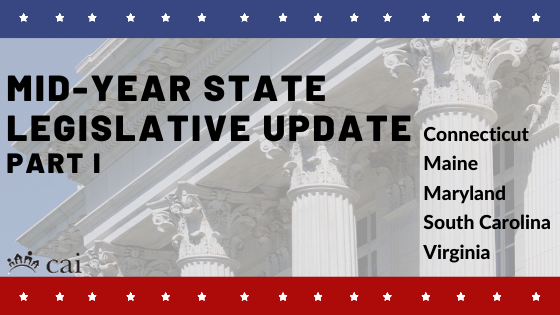Most state legislative sessions have formally adjourned as the COVID-19 pandemic continues to dominate 2020. However, state legislatures are experiencing an unprecedented number of special sessions. CAI’s legislative action committee (LAC) volunteers and lobbyists continue to demonstrate their strength in protecting CAI members from legislation that would have a negative impact on their communities while advocating for laws that benefit homeowners associations, condominium communities, and housing cooperatives.
Here is the first part of a series focusing on legislative issues impacting the community association housing model.
Connecticut
The Connecticut House of Representatives introduced several bills impacting community associations, including not allowing associations to enforce covenants regulating childcare services and electric vehicle charging stations within their communities. The Connecticut LAC closely monitored these bills, none of which passed. The Connecticut legislature will begin a special session this month.
Maine
Maine’s General Assembly introduced a bill this spring regulating the responsibilities of property owners for the maintenance and repair of private roads. The Maine LAC closely monitored this bill and its implications on the community association industry. The bill didn’t pass.
Maryland
The Maryland LAC actively tracked more than 60 bills directly impacting community associations in the state. The most notable legislation was spearheaded by the state LAC in the house and the senate, which increased a condominium unit owner’s deductible responsibility from $5,000 to $10,000 if a casualty loss originates in a unit or from a component that services only that unit. The bill also sought to clarify that the deductible for losses that originate from outside the units and common elements is a common expense. This bill passed the Maryland General Assembly and will become law on October 1, 2020.
South Carolina
The South Carolina LAC worked directly with bill sponsors in the general assembly this spring to advocate on behalf of the community association industry. The South Carolina General Assembly introduced several bills this year attempting to regulate an association’s ability to preclude a homeowner from displaying a “for sale” sign, political signs, and state flags, as well as an association’s ability to foreclose on a resident in arrears. No legislation negatively impacting community associations passed this year. The general assembly is expected to meet for a special session to address COVID-19-related issues in September.
Virginia
The Virginia LAC actively lobbied for 13 bills during the 2020 legislative session, including virtual board meetings (veto session legislation), political signs, solar panels, electric vehicle charging stations, fair housing, and resale disclosure. The VA LAC’s efforts were successful. The group worked with legislators interested in community association legislation and the Common Interest Community Association Work Group of the Virginia Housing Commission. Following the end of the 2020 formal session, the Virginia General Assembly held a special session where the VA LAC lobbied the governor’s office to override requirements in the Virginia Property Owners’ Association Act and Virginia Condominium Act, which require at least two board members be physically present in the same location to convene a meeting properly. This new law allows community association boards to meet virtually during the COVID-19 pandemic.
For more information on what is happening or happened in your state during the 2020 legislative session, click here.




Lobby for change is meeting law requirements.
We have been using Zoom for meetings and love it!
Florida and probably many other states have”Sunshine Laws that require open, in person meetings.
Whether Zoom or other virtual meeting technologies, there is a huge advantage to holding virtual meetings for HOA and definitely for COA’s:
Attendance is available for absentee owners.
Internet or phone services are accommodated.
Attendance is available to more members’
Board membership can include absentee owners.
The schedule for the time and day of the meeting can be adjusted to meet more member’s needs rather than meeting room availability in common buildings.
Let’s take advantage of the need to be socially distant to increase the effectiveness of HOH/COA governance.